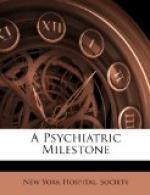FOOTNOTES:
[Footnote 1: Address of the Governors of the New York Hospital, to the Public, relative to the Asylum for the Insane at Bloomingdale, New York, May 10th, 1821. Reprinted by Bloomingdale Hospital Press, White Plains, May 26, 1921. See Appendix V, p. 212.]
The Chairman: In celebrating our centenary we are naturally dealing also with the larger subject of general psychiatry. Our success in this discussion should be materially promoted by the presence with us of Dr. Adolf Meyer, Professor of Psychiatry in the Medical School of Johns Hopkins University, and Director of the Phipps Psychiatric Clinic, of Baltimore. Before taking up this important work in that famous medical centre, Dr. Meyer was actively engaged for several years in psychopathic work in New York. He will speak to us on “The contributions of psychiatry to the understanding of life problems.”
DR. MEYER
When Dr. Russell honored me with the invitation to speak at this centenary celebration of the renowned Bloomingdale Hospital, my immediate impulse was to choose as my topic a phase of psychiatric development to which this Hospital has especially contributed through our greatly missed August Hoch and his deeply appreciated coworker Amsden. I have in mind the great gain in concreteness of the physician’s work with mind and the resulting contribution of psychiatry to a better knowledge of human life and its problems. The great gain this passing century is able to hand on to its successor is the clearer recognition of just what the psychiatrist actually works with and works on.
Of all the divisions of medicine, psychiatry has suffered longest from man’s groping for a conception of his own nature. Psychiatry means, literally, the healing of souls. What then do we actually mean by soul or by psyche? This question has too long been treated as a disturbing puzzle.
To-day we feel that modern psychiatry has found itself—through the discovery that, after all, the uncritical common-sense view of mind and soul is not so far remote from a critical common-sense view of the individual and its life activity, freed from the forbidding and confusing assumptions through which the concept of mind and soul has been held in bewildering awe.




